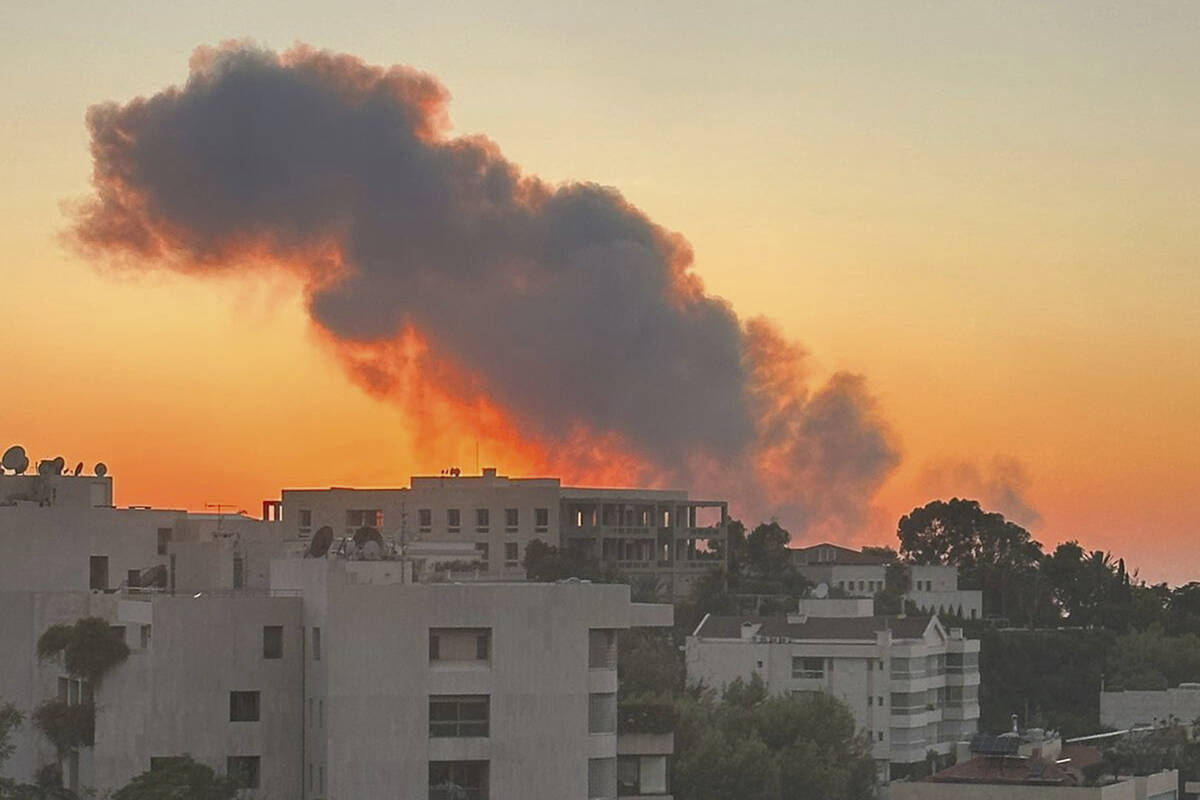Israel strikes Hezbollah’s headquarters in Beirut

BEIRUT — The Israeli military said it struck Hezbollah’s headquarters in Beirut on Friday in a series of massive explosions that targeted the leader of the terrorist group and leveled multiple high-rise apartment buildings.
At least six people were killed and 91 were wounded, Lebanon’s health ministry said.
Hezbollah leader Hassan Nasrallah was the target of the strikes on the terrorist group’s headquarters, according to two people familiar with the matter who requested anonymity, including one United States official.
The Israeli army declined to comment on who it was targeting. It was not immediately clear if Nasrallah was at the site, and Hezbollah did not comment on the report.
Israel launched a series of strikes on other areas of the southern suburbs following the initial blast.
After the strikes, Prime Minister Benjamin Netanyahu abruptly cut short a visit to the United States to return home. Hours earlier, he addressed the United Nations, vowing that Israel’s intensified campaign against Hezbollah over the past two weeks would continue.
News of the blasts came as Netanyahu was briefing reporters after his U.N. address. A military aide whispered into his ear, and Netanyahu quickly ended the briefing.
Israeli army spokesperson Rear Adm. Daniel Hagari said the strikes targeted the main Hezbollah headquarters, saying it was located underground beneath residential buildings.
The series of blasts at around nightfall reduced six apartment towers to rubble in Haret Hreik, a densely populated, predominantly Shiite district of Beirut’s Dahiyeh suburbs, according to Lebanon’s national news agency. A wall of billowing black and orange smoke rose into the sky as windows were rattled and houses shaken some 18 miles north of Beirut.
Israel provided no immediate comment about the type of bomb or how many it used but the resulting explosion levelled an area greater than a city block. The Israeli army has in its arsenal 2,000 pound American-made “Bunker Buster” guided bombs designed specifically for hitting subterranean targets.
Richard Weir, crisis and weapons researcher with Human Rights Watch, said the blasts were consistent with that class of bomb.
Israel’s air forces followed with a new set of strikes early Saturday, also in the southern suburbs, shortly after warning residents of three buildings to evacuate, saying they were being used by Hezbollah to hide weapons, including anti-ship missiles. Israel’s military announced additional attacks on Beqaa in eastern Lebanon and Tyre in the south.
The Pentagon said the U.S. had no advance warning of the strikes.
Nasrallah has been in hiding for years, very rarely appearing in public. He regularly gives speeches, but always by video from unknown locations.
The site hit Friday evening had not been publicly known as Hezbollah’s main headquarters, though it is located in the terrorist group’s “security quarters,” a heavily guarded part of Haret Hreik where it has offices and runs several nearby hospitals.
Four hours after the strike, Hezbollah had still not issued any statement referring to it. Instead, it announced that it had launched a salvo of rockets at the Israeli city of Safed, which it said was “in defense of Lebanon and its people, and in response to the barbaric Israeli violation of cities, villages and civilians.”
The Israeli military said a house and a car in Safed were hit, and officials said a 68-year-old woman suffered mild shrapnel wounds.
The scope of Israel’s operation remains unclear, but officials have said a ground invasion to push the terrorist group away from the border is a possibility. Israel has moved thousands of troops toward the border in preparation.
Iranian-backed Hezbollah, the strongest armed force in Lebanon, began firing rockets into Israel almost immediately after the Oct. 7 Hamas-led terrorist attack, saying it was a show of support for the Palestinians. Since then, it and the Israeli military have traded fire almost daily, forcing tens of thousands of people to flee their homes on both sides of the border.
An Israeli security official said he expects a possible war against Hezbollah would not last as long as the current war in Gaza, because the Israeli military’s goals are much narrower.
In Gaza, Israel aims to dismantle Hamas’ military and political regime, but the goal in Lebanon is to push Hezbollah away from the border with Israel — “not a high bar like Gaza” in terms of operational objectives, said the official, who spoke on the condition of anonymity due to military briefing guidelines.
The Israeli military said it carried out dozens of strikes around the south Friday, targeting Hezbollah rocket launchers and infrastructure. It said Hezbollah fired a volley of rockets toward the northern Israeli city of Tiberias.
Israel says its accelerated strikes this week have already inflicted heavy damage on Hezbollah’s weapons capabilities and its fighters. But the group boasted a large arsenal of rockets and missiles and its remaining capacities remain unknown.
Hezbollah officials and their supporters remain defiant. Not long before the explosions Friday evening, thousands were massed in another part of Beirut’s suburbs for the funeral of three Hezbollah members killed in earlier strikes, including the head of the group’s drone unit, Mohammed Surour.
Hussein Fadlallah, Hezbollah’s top official in Beirut, said in a speech that no matter how many commanders Israel kills, the group has endless numbers of experienced fighters who are deployed all over the front lines. Fadlallah vowed that Hezbollah will keep fighting until Israel stops its offensive in Gaza.
———
AP writers Tia Goldenberg at the United Nations, Abby Sewell in Beirut, and Zeina Karam in London, contributed to this report.